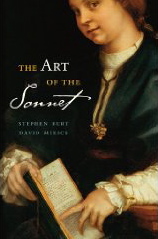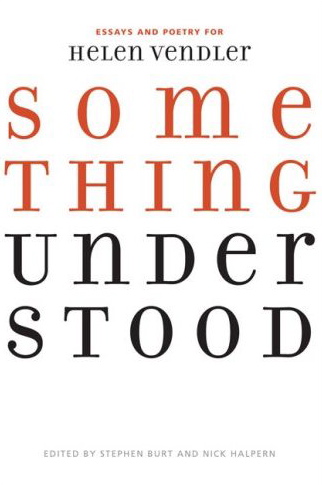Still in Onset; just saw Falmouth Center (pretty pretty, pretty pretty) and Woods Hole (even prettier). Not as much ocean science on exhibit at the exhibits there as I had hoped, but we did see the inside of Alvin, along with startling pictures of life around hydrothermal vents. There’s a poem in there somewhere.
Lots of poems, some in translation, in Rachel Hadas, interviewed in the current CPR.
That was the day; for tonight, I’ve been rereading and enjoying Daniel Karlin’s Penguin Book of Victorian Verse (not to be confused with George MacBeth’s book of the same title, which we own). Christina Rossetti had a better ear than just about anyone, and I can’t get enough of her (neither can any anthology, really), though her tonal range was perhaps limited. Also neat to rediscover: Augusta Webster, who would probably be in our book about sonnets if that book had, not 100 sonnets, but 104. (If we can’t secure copyrights to a 20th-century sonnet or two, she might make it in after all: the problem is that “Mother and Daughter” works much better cumulatively, as a sequence, than when you read the sonnets one by one.) And Coventry Patmore’s “The Toys,” almost a stand-in for minor Victorians in general: if you like this poem, you’ll want to spend your free time (as I do) with anthologies of Victorian poetry; if not, then perhaps not. I suspect there’s more good Patmore out there, though his views on politics and culture have made him, let’s say, less than fashionable; I’m pretty sure the secretly-good Patmore does not include sonnets– we checked– though perhaps there’s a fourteen-line experiment anthologists overlooked. Similarly, this fine, wry poem by Sarah Morgan Bryan Piatt just isn’t a sonnet: it’s a two-stanza poem with 14 lines. Once you start seeking sonnets everywhere, it can get hard to stop.
We are in Onset, Mass. It’s beautiful, and just barely, or perhaps not quite, in Cape Cod: you can sit by a tree on a hill overlooking a bay, if you like, and think about the young Longfellow in Portland. Or just think about parodic plural terms, not all of which are fit for a family newspaper, but all of which, taken together, make an impression: the site’s worth a look. I’ve been reading about plurals and other features of language, considered as linguists consider them this week, and the technical term of the day is pluralia tantum. Who knew there were just so many (not counting the parodies)?
I’m in the midst of Nicholson Baker’s short new novel, which– well, you’ll see when I’m done with it. It’s fun, and it’s about poetry, and I’ve agreed to write about it elsewhere once I’m done…
Almost completely unrelated to one another, but worth a link, and recommended: this satirical site for new parents; Wallace Stevens; and the new Colorado Review, which has very good poems by Jennifer Moxley, by Heather Kirn (of whom I had never before heard), and by Ange Mlinko. Dig in.
If you are a teacher of literature, and if you teach at an institution with a graduate program in literature, and if that graduate program has oral qualifying exams (a.k.a. generals), and if you have anything to do with those exams, and if those exams cover many fields and periods for all comers (rather than just the field in which a given student expects to specialize), then you will find yourself at some point reading or rereading works at least two centuries and one genre away from what you normally read or read, and you might remember with some small distress how long, or how difficult, some of those works can seem, but you might also discover, or rediscover, such wonderful passages as this one, from Julian of Norwich: it’s chapter V from “A Revelation of Love,” in which she has a vision of “our good lord”:
“And in this he shewed a little thing the quantity of an haselnot, lying in the palme of my hand as me semide, and it was as rounde as any balle. I looked theran with the eye of my understanding and thought: ‘What may this be?’ And it was answered generally thus: ‘It is all that is made.’ I marvayled how it might last, for methouight it might sodenly have fallen to nought for littlenes. And I was answered in my understanding: ‘It lastesth and ever shall, for God loveth. And so hath all thing being by the love of God.”
And then, also from the medieval list, Hugh of St. Victor, with sobering advice: “There are those who wish to read everything. Don’t vie with them. Leave well enough alone. It is nothing to you whether you read all the books there are or not. The number of books is infinite: don’t pursue infinity! Where no end is in sight, there can be no rest. Where there is no reast, there is no peace. Where there is no peace, God cannnot dwell. ‘His place,’ says the Prophet, ‘is in peace, and his abode in Sion.’” (Translated from the Latin by Jerome Taylor)
I’m up at the National Book Critics Circle blog talking about enumerating recent reading: I seem to have developed a love/ hate/ scratch-head relationship with the latest book by Rachel Zucker. I disliked her first two, never saw her third, and am now enthused and discombobulated by the fourth. If you get it, start with the one where one of her kids has a fever.
In the latest Jacket, Rob Stanton (a critic I want to read more often) looks at Joseph Massey’s big collection of small things.
I so want this book, and not just because a few of our friends are in it.
Courtney Queeney in Bookslut has a thoughtful essay about feminism, femininity, and contemporary poems. She thinks I’m falling prey to unconscious sexism when I praise Ange Mlinko, in an early poem of hers, for virtues that “Personal Poem,” “Fra Lippo Lippi,” and Paterson also possess, which is weird, but I take her larger points: scroll down for spot-on comments about Glück’s justly famous poem “Mock Orange.”
Here’s a prolific and thoughtful poetry blog, full of interviews with editors, I’m glad to have (just) seen.
Jen Hadfield, a Scottish poet whose work (fragmented couplets, prose poems, sense of place) I like a lot, really ought to be known to more than three Americans: you can read a neat new interview with her at the Scottish Poetry Library blog.
And in non-poetry news that still counts as arts news, I saw the Trash Can Sinatras last night, with high expectations, and was surprised to discover that though the TCS surely practice a lot, and the lead singer has quite a flexible voice, the new Youth Group record (which the club had on the stereo) was not only simpler and more “commercial” (whatever that means these days) but better, with more internal variety, too.
I’ve just now discovered the Structure and Surprise blog, which supplements and comments on the poetry-and-poetics material in Michael Theune’s edited volume, which I think I’ll have to read.
I’m in yesterday’s NYTBR. Bite-size reviews, but they were fun to write: some people are going to have their lives changed by the Waldrep, and others by the Estes, though I fear that nobody except me will have a life changed and improved by both. Prove me wrong, broad-minded contemporary connoisseurs…
Joel Brouwer gives Harriet a long and thoughtful review of three books I spent some time considering too: Chris Martin’s book-length neo-New York School project, Karen Volkman’s beautiful, dense sonnets, and Rick Barot’s latest.
Want to buy Publishers Weekly? Because someone should.
In non-poetry news (though it’s certainly arts news) we have been spending as much time as possible at outdoor music events: Nathan and I saw Metric, Passion Pit and the Gaslight Anthem at City Hall Park two days ago; the week before that, all three of us hit the Lowell Folk Festival, where a friend is part of the sound-and-stage tech team; and, before that, and best of all in a number of ways, a weekend away at the Green River Festival, an outdoor music event of a kind I had never attended before: we loved it, Nathan loved it, and we’re going again.
And in other non-poetry news, I’m finally reducing the size of the contemporary fiction stack (I may have more to say about such matters at Critical Mass soon enough). Jedediah Berry’s Manual of Detection is terrific, for what it is (sinuously self-conscious neo-meta-noir) and has stayed in my head for weeks now after I’ve finished it; and Atwood’s The Blind Assassin, which Lev put on the TIME roster of the 100 best modern novels, has held my attention raptly so far– though you might want to be warned that, so far, it’s absolutely comfortless, even compared to Oryx and Crake. Speaking of which: there’s a companion novel (a sequel, even) to O&C, due soon.








